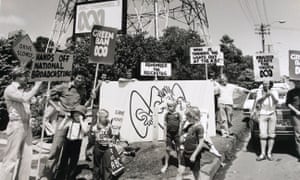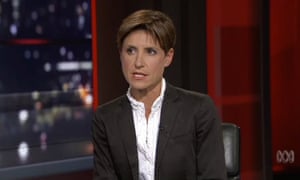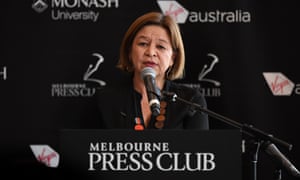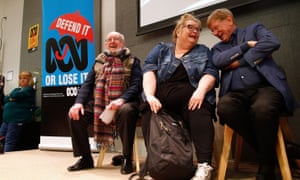Extract from The Guardian
The existential threat to the national broadcaster has perhaps never
been greater. In part one of a two-part series, Amanda Meade looks at
the forces gathered against Aunty
Kerry O’Brien was a young reporter on Four Corners in the 1970s when
Malcolm Fraser cut the ABC’s budget and accused the broadcaster of a
leftwing bias on its flagship current affairs programs.
“I remember standing at the front of the ABC’s Gore Hill studios with friends like [investigative journalist] Allan Hogan holding placards of protest against the cuts, all flared trousers and cheesecloth shirts and long hair,” O’Brien told Guardian Australia. “And we thought that was pretty crook.”
Now retired from daily journalism and writing his second book, a memoir, O’Brien has joined a chorus of widespread concern about the survival and independence of the ABC. He’s more worried than ever before, says the pressure on the ABC is the “most overt” he has seen. For a man who endured constant accusations of his own bias, that’s saying something.
O’Brien has long term perspective, too. “I can remember the Fraser years, which were pretty intense,” he says. “From the outside watching the whole process, I think it’s worse now.”
Even the infamous Jonathan Shier years don’t compare, he says. When John Howard was in power and O’Brien was host of the 7.30 Report in the early 2000s, the ABC board appointed Shier as managing director. Over the next 18 months, until Shier was removed by the board, O’Brien says it was like “a rampaging bull went through the place”.
“The Shier era was quite destructive,” O’Brien says. “Good people were lost to the ABC through that period. That was a climate of punishment. There was a real sense that we were being punished by a government which purported to support public broadcasting.”

“I remember standing at the front of the ABC’s Gore Hill studios with friends like [investigative journalist] Allan Hogan holding placards of protest against the cuts, all flared trousers and cheesecloth shirts and long hair,” O’Brien told Guardian Australia. “And we thought that was pretty crook.”
Now retired from daily journalism and writing his second book, a memoir, O’Brien has joined a chorus of widespread concern about the survival and independence of the ABC. He’s more worried than ever before, says the pressure on the ABC is the “most overt” he has seen. For a man who endured constant accusations of his own bias, that’s saying something.
O’Brien has long term perspective, too. “I can remember the Fraser years, which were pretty intense,” he says. “From the outside watching the whole process, I think it’s worse now.”
Even the infamous Jonathan Shier years don’t compare, he says. When John Howard was in power and O’Brien was host of the 7.30 Report in the early 2000s, the ABC board appointed Shier as managing director. Over the next 18 months, until Shier was removed by the board, O’Brien says it was like “a rampaging bull went through the place”.
“The Shier era was quite destructive,” O’Brien says. “Good people were lost to the ABC through that period. That was a climate of punishment. There was a real sense that we were being punished by a government which purported to support public broadcasting.”

Today, government support for the national broadcaster – the most trusted and loved media organisation in the country – seems missing in action. The threat to Aunty’s remit is, according to some, existential. The official line from the ABC is that it’s business as usual. That global media disruption has compounded the pressure the ABC is under from the usual political and commercial forces. But with ongoing funding cuts, complaints of bias, government reviews, Murdoch media antagonism, internal instability, and a communications minister who is a member of a rightwing think tank that advocates the end of public broadcasting, the forces against the ABC loom large.
A fox in the henhouse
Four years later Turnbull, now prime minister, imposed an additional $84m “indexation pause” – and ordered a second efficiency review.O’Brien told an ABC Friends rally: “Two inquiries into the efficiency of public broadcasting in four years. What was wrong with the first one?”
Heading up this second efficiency review are former Foxtel boss Peter Tonagh and former Australian Communications and Media Authority acting chairman Richard Bean. While Bean, a career public servant, is an obvious choice for his knowledge of the area, the appointment of Tonagh by the communications minister, Mitch Fifield, was interpreted as putting a fox in the henhouse. Before Foxtel, Tonagh was the CEO of News Corp Australia, a company that makes no secret of its desire to see Aunty shrink.
Under Michelle Guthrie, the ABC is not only punch-drunk from radical restructures and the loss of 1,012 jobs in four years, it is confronting parliamentary reviews, inquiries, and bills to change the ABC Act. On top of the second efficiency review, the ABC and SBS are also the subject of a competitive neutrality review – a chance to ask “whether the ABC is using their privileged status to smother commercial operators”, according to the Australian.
The government intervention comes after a volley of complaints from Rupert Murdoch’s empire and other commercial rivals, pressure from rightwing think tank the Institute of Public Affairs, and an increasingly conservative wing of the Liberal party.
A resounding vote in favour of privatising the ABC at the Liberal national council conference in June exacerbated the tension between the ABC and the Coalition. Privatising the public broadcaster is a radical proposal outlined in a May book by RMIT academics and IPA adjunct fellows Chris Berg and Sinclair Davidson, Against Public Broadcasting: Why We Should Privatise the ABC and How to Do It.
They argue that the ABC is a billion-dollar drain on the commonwealth budget and technological change has rendered it an anachronism. Its functions, they say, could more efficiently be supplied by the commercial media.
A few years ago such a proposal would have been dismissed as a fringe fantasy, but the council vote dragged it into mainstream discussion, despite the government moving quickly to downplay the vote’s significance.
The treasurer, Scott Morrison, said the Liberal council did not dictate government policy and the Nationals said they would never support privatising the ABC, the lifeblood of the bush.
“Members, rank and file, can go to their party meetings and they can vote for things,” Morrison said. “The government is not privatising the ABC.”
O’Brien says the broader shift to the right within the Liberal party is clear regardless of denials about privatisation. “Probably the most worrying thing about what we saw with the federal council of the Liberal party was that the people driving it are potentially tomorrow’s leaders of the Liberal party,” he said.
The Coalition might not sell off the ABC but they have handed Labor a terrific campaign tool, and that’s not a healthy development for an independent public broadcaster.
University of Melbourne media academic Denis Muller says: “It’s not great for the ABC for Labor to be barracking for the ABC. And I don’t think it’s great for the ABC to be a political football.”
News Corp’s obsession
The infiltration of the IPA’s views about the ABC into the mainstream have come courtesy of News Corp and its constant stream of anti-ABC commentary, led by the national broadsheet, the Australian. The Australian’s senior commentators including Chris Kenny, Gerard Henderson, Chris Mitchell, and Darren Davidson, are joined regularly in criticising the ABC by rightwing columnists in the Murdoch tabloids.When the ABC makes missteps, the editors pile on with extensive, often front-page coverage, as happened when an analysis of tax policy by senior economics correspondent Emma Alberici was taken down and rewritten.
In an address to the ABC Friends rally in Sydney, O’Brien called out the “constant vigilance from News’s ABC re-education committee, ably led by Andrew Bolt, Piers Ackerman, Miranda Devine, Janet Albrechtsen and the rest. Boringly repetitive. Dripping with poison”.

O’Brien believes News Corp’s obsession with the ABC has worsened over the years. “It’s become more and more irrational in a sense, unless you accept that it is part of a push to diminish the ABC as a rival to their commercial interests,” he says.
“Open a Murdoch paper – some are worse than others – and you’ll find something negative about the ABC.”
As media disruption caused by the digital age continues to hurt the local industry, the calls from commercial rivals for the ABC to curb its reach now extend beyond News Corp to Fairfax and Crikey’s publisher, Eric Beecher.
Both Fairfax and News Corp have complained that the ABC is spending taxpayer dollars to promote its online news and stealing their audience in the process. The commercial TV lobby has also complained loudly about the public broadcaster expansion into digital services and catch-up TV.
The ABC has indeed grown. Under former managing director Mark Scott, it launched a 24-hour news channel as well as extra digital TV and radio channels, TV streaming and a website hosting opinion and features as well as news.
The Australian, which was putting up paywalls as its newspaper advertising revenues declined, was hostile to Scott’s embrace of new technologies and his argument that the ABC had to be everywhere. Its writers sniped constantly about ABC News 24 and The Drum. Soon after Guthrie took over from Scott in 2016, the popular Drum opinion website, which Beecher had accused of encroaching on Crikey’s territory, was taken down.
To fund the digital expansion, traditional programming has been downsized, attracting more complaints – but this time from ABC supporters. Lateline and the state-based 7.30 programs have been axed and radio current affairs shows PM and The World Today slashed in half. Radio National’s budget has been chipped away.
The ABC is now essentially offering an online newspaper with audio and video on demand, alongside linear TV and radio. Insiders say this rapid expansion into online news has come at a cost, and that the Alberici controversy could have been avoided if the ABC had enough senior editors who understood the pitfalls of online publishing.
Although the broadcaster is independent from government and decides how it spends its budget allocation of $1.1bn, the Coalition has a sympathetic ear to complaints from rival media that the ABC’s tentacles have grown at an alarming rate. The irony is the ABC has had to expand on a diminishing budget as funding to make content has declined by 28%, or $336m, in real terms since the mid 1980s.
Muller believes the government is doing Murdoch’s bidding because the ABC is a commercial rival.
“It shows what happens when you move the debate incrementally in one direction,” Muller says. “You just keep nudging away, saying the ABC is too lefty, the ABC doesn’t deliver value for money, the ABC is overfunded, the ABC needs to submit itself to an efficiency dividend like everyone else, the ABC needs a review.”
In March this year the government handed Murdoch something his outlets had been lobbying hard for: a competitive neutrality review to examine whether public broadcasters take “undue advantage of their government ownership, to the detriment of competitive outcomes” and whether there are different regulations governing public and commercial broadcasters. The review is the best chance the commercial media has to curb not just the ABC but also SBS, which streamed one of the year’s most popular dramas, The Handmaid’s Tale.
Submissions to the inquiry were published on Monday and the recommendations will be delivered in September. In its submission News Corp called on the government to review the ABC’s charter on a regular basis to ensure it isn’t encroaching on its newspapers and Sky News and bar it from advertising its news content online.
In its submission Fairfax, the publisher of the Sydney Morning Herald and the Age, accused the ABC of “cannibalising” its audience and stealing a potential $30m in advertising revenue by “aggressively” expanding online.
Guthrie’s team is confident its submission outlines that the ABC is doing exactly what it was set up to do and is not stepping on anyone’s toes.
Writing in the Australian last week, the veteran News Corp editor and media commentator Mark Day predicted the efficiency and the competitive neutrality reviews would have wide-reaching consequences for public broadcasting.
“The two inquiries, run separately but concurrently, have the potential to reshape the ABC and SBS; what they do and how they do it,” Day said. “The inquiry reports, expected this year, could hasten the end of broadcasting as we have known it for a century.”
Good journalism or leftwing bias?
In recent months, there has been a sustained attack by Fifield and other Coalition members on ABC content that has not been seen since the former communications minister Richard Alston was a serial complainant in the 2000s. Even comedy sketches and Facebook posts have been scrutinised, along with the relentless attacks on Alberici. Fifield made six complaints about ABC content in six months alone.And while Chris Berg and Sinclair Davidson’s book Against Public Broadcasting protests the drain on the public purse, it is the alleged left-leaning content of the ABC they want to stifle.
They write: “It is a large participant in the political process that is able to set the political agenda and frame issues in ways which its disproportionately left-leaning staff favour.”
O’Brien says the government mistakes good journalism for leftwing bias. “The pressure on the government to have a royal commission into the banking sector came primarily from a series of programs on Four Corners,” O’Brien says.
“Why is that leftwing? Why isn’t it just good journalism? I tried to explain this to John Howard once. It’s probably the biggest fallacy in the whole debate about the ABC – that just because a journalist or a news organisation does that type of story does not make them a subversive socialist.”
A day after Labor promised to restore the funding freeze if elected, Fifield complained to ABC management again, this time accusing senior correspondents Laura Tingle, Andrew Probyn and Barrie Cassidy of repeating “Labor lies” over the timing of byelections. Only one complaint against Probyn was upheld.
Fifield had been busy behind the scenes too. While sitting on the executive at the Liberal party federal council, he proudly outlined all his measures “to make sure that the ABC is being the best possible steward of taxpayer resources that it can be”. It was not government policy to privatise the ABC, he told the council, but this is what we’ve done: an indexation pause, an efficiency review, a competitive neutrality inquiry, and a range of proposed measures to change the ABC Act.
These Fifield measures and plans are the result of backroom deals with minor parties and lobbying from corporate interests hostile to the ABC.
Fifield is backing three bills to change the Australian Broadcasting Corporation Act 1983 before Senate – yet to be debated – all part of the government’s deal with Pauline Hanson to pass the media reform package last year.
One is to add the words “fair and balanced”; another would force the ABC to report pay details of presenters in excess of $200,000; and a third would require the ABC to broadcast programs that “contribute to a sense of regional and national identity” and establish a regional advisory council. Guthrie told Senate estimates in April the measures were “unnecessary and unjustified”.
Former ABC presenter and public broadcasting advocate Quentin Dempster says the ABC faces a hostility crisis. “It is unprecedented,” Dempster told Guardian Australia.
“Previous ABC funding haircuts were administered by the Hawke/Keating and Howard governments in the 1980s and 1990s. But the current array of measures, without prior negotiation with the ABC board, seem calculated to undermine the ABC’s evolution as an effective player in Australia’s digital media future.”
Labor’s shadow communications minister, Michelle Rowland, says public broadcasting has hit peak pressure. “It’s a pressure trifecta: financial, ideological and technological. Digital disruption is difficult enough on its own for any business or institution these days, and it’s well established that the media sector is facing those challenges,” she told Guardian Australia.
“Add to the mix political interference from the responsible minister through to Pauline Hanson; top it off with another round of budget cuts and it’s not a good outlook for the ABC.”
Guthrie defends beloved Aunty
Guthrie abandoned her diplomatic, low-key style when she addressed the Melbourne Press Club in June after being criticised by ABC broadcaster Jon Faine for her silence. In July her chairman, Justin Milne, followed suit, delivering a strong riposte to the sniping from commercial rivals.Guthrie directly defended the ABC from the litany of attacks from the Coalition, the IPA, News Corp and other media competitors. For ABC supporters, including those within the organisation frustrated by the relentlessness of the attacks, the managing director sounded more like a leader than she had at any other point in her 25-month tenure.

The national broadcaster, she said, was a priceless asset that should not be sold or “pushed and prodded into different shapes” to suit the prevailing climate.
And the people of Australia “regard the ABC as one of the great national institutions and deeply resent it being used as a punching bag by narrow political, commercial or ideological interests”.
Guthrie is right. The ABC is the most trusted media organisation in the country by a large margin, and is one of the nation’s most trusted institutions. According to a recent Media Net survey only 9% of Australians distrust the ABC while according to its own tracking, more than 80% of Australians trust Aunty, compared with an average of just 57% for commercial media. To chip away at this trust, News Corp has kept up its assault on the ABC.
While Bolt labelled Guthrie’s speech “absolute bull” and accused the ABC of “rampant bias”, ABC supporters were thrilled to hear her standing up for Aunty with such force.
It was quite a backflip for the former Google executive who rarely speaks publicly or gives interviews, and who just last year said it wasn’t her job to lobby the government for more funding. “On my second day in the job I was handed down the triennial funding in the May budget and as far as I’m concerned we operate within that three-year funding envelope,” she told a Senate estimates committee.
Former Labor minister Margaret Reynolds spent 16 years in Canberra, under Labor prime ministers Bob Hawke and Paul Keating and Coalition PM John Howard. Now the national spokeswoman for Friends of the ABC, Reynolds says governments of all political persuasions at times have their fights and grievances with the ABC.
“You can point to different comments that were made in my time by Hawke and Keating and Howard,” she told Guardian Australia. “There will always be a bit of a tension between the government of the day and the independent public broadcaster. I mean that’s just the way things are.
“But what we’ve seen since the 2014 budget goes beyond that normal tension and rivalry of the ABC not reporting a government as it might like to be reported. It’s much more serious and it’s partly due to the structural challenges the media is facing at the moment.
“I describe it as a perfect storm. You’ve got sections of the government being antagonistic; you’ve got Rupert Murdoch who is finding the competition from Google to Amazon is challenging his bottom line.”
The ABC’s chief financial and strategy officer Louise Higgins, who is Michelle Guthrie’s second in command, brushes off concerns about external pressure, preferring to take the long view of the 86-year-old public broadcaster.
“The historical context is important; there are constant and continuous political and commercial pressures on the ABC,” Higgins told Guardian Australia. “Having been inside the BBC for a decade it was no different. It is compounded by the fact that media in of itself is going through such a disruption. The question is how does public service broadcasting the world over maintain its independence when it is government or licence-fee funded? What we are seeing globally is unprecedented in terms of the globalisation of technology and content.”
O’Brien says voters should take the ABC into account when they go to the ballot box. “If the public broadcaster is important in a person’s life then I think that person has got to take seriously the possibility of a real political assault on the ABC in the future. And you know there are some things that are important but not vital. I regard the ABC as a vital part of Australian culture and social and political life.
“It has provided part of the foundation for a healthy democracy. And I know democracy’s looking a bit battered at the moment – that makes the ABC even more important.”
Coming in part two: Culture overhaul, staff unrest, and new directions for a much-loved institution

No comments:
Post a Comment